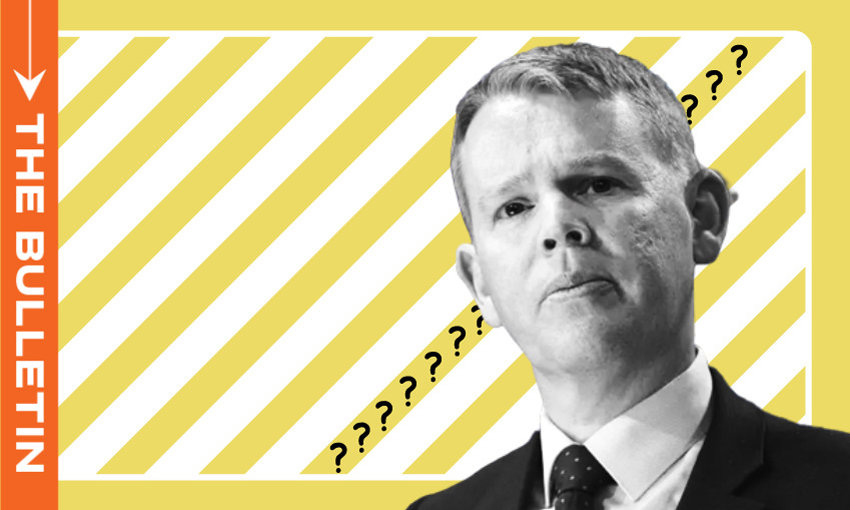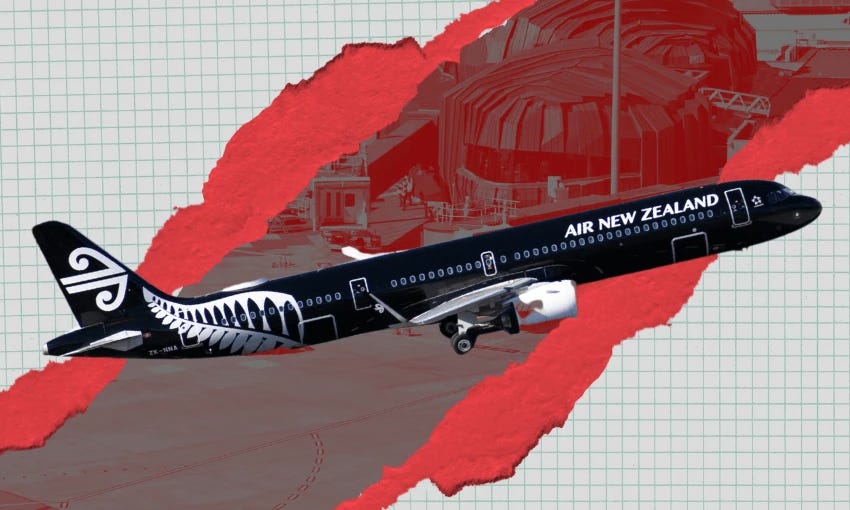A Covid inquiry ends and another begins
Phase two of the Royal Commission into the Covid-19 response will look at broader issues including vaccine safety and economic ramifications.
Mōrena, and welcome to The Bulletin for Friday, November 29.
In today’s edition: An anonymous donor has purchased a copy of a Te Tiriti handbook for every secondary school in New Zealand, a social media ban for children under 16 will soon become law in Australia, and Health New Zealand spent $72 million on contractors and consultants for a single IT project. But first, dissecting the Covid inquiry.
The Covid inquiry has been made public
We talked briefly yesterday about the Royal Commission of Inquiry into the Covid-19 response, but that was before any of us had been given a chance to read it. Outgoing chair Tony Blakely gave a briefing to media earlier in the week where he urged the government to release it immediately. "For phase two to be maximally useful to the New Zealand taxpayer, you want to build on phase one – so let's get it out there." And that’s exactly what happened. Yesterday afternoon, all 700-plus pages of the report, plus a not-exactly-brief 110 page summary were dropped publicly.
Helpfully, The Spinoff has summarised everything you need to know – including positive and more critical reflections on the Covid response. The inquiry praised the initial communication strategy, but said that the ongoing presence of then-PM Jacinda Ardern at daily briefings was later seen to be “politicising” a health issue by some. On the practical side, the inquiry noted that “transitions from one strategy to the next were fuzzy and not always well-signalled” – such as moving from an elimination to suppression approach. On the use of lockdowns, the report found they were successful as a public health measure and that the widely criticised 2021 lockdown in Auckland was justified, though noting that there were reasons we had to rely on shutting down parts of the country for so long (such as slow border closures). On mandates and vaccine requirements, they proved both reassuring to some and drove division. In hindsight, the report noted, they have had “substantial, long-lasting impacts that would need to be taken into account in any future decisions around their use in a pandemic response”.
In total, as helpfully summarised by RNZ, the report makes 39 primary recommendations.
A lot to learn
The Spinoff’s Duncan Greive, in an interview with the commissioners early on in their tenure, reported that the Royal Commission was to be future-focused, rather than explicitly looking back at what went wrong. It was expressly set up to examine “the lessons learned from Aotearoa New Zealand’s response to Covid-19 that should be applied in preparation for any future pandemic”. In comments shared via the Science Media Centre, former Covid modeller Michael Plank said the report made a series of helpful recommendations, including the establishment of a central agency for pandemic planning and coordination. “To improve our chances of avoiding things like lockdowns, border closures and overflowing hospitals, we need to get serious about preparing for a range of different pandemic scenarios now,” said Plank. “We need to invest in our health system, science sector, community services, and public health functions like testing, contact tracing and vaccine delivery.”
Public health expert Michael Baker noted that implementing the report’s recommendations would be a “big challenge” and it was concerning that Te Whatu Ora had just announced cuts in positions in the National Public Health Service and its Digital and Data teams. “There is a strong argument to halt these cuts while NZ is implementing the recommendations of the Covid-19 inquiry.”
There is no indication yet when (or if) the government will respond to the inquiry’s recommendations, reported RNZ.
A political reckoning
Many still hold a grudge against the former Labour government for the strict measures implemented during the pandemic. While it was responsible for the party’s historic victory in 2020, it also contributed to its dramatic fall from grace in 2023. Current Labour leader Chris Hipkins was the minister for the Covid-19 response for much of the pandemic and spoke to media yesterday, reported the Herald’s Jamie Ensor. Hipkins accepted that mandatory vaccinations affected social cohesion, and that while Jacinda Ardern’s comment about the government being the “single source of truth” related to a specific issue, it ended up making people believe government decisions were “incontestable”. Hipkins said he did not believe border restrictions or vaccine rules were a “mistake”, though acknowledged they “came at a very big cost”. But speaking with Newstalk ZB’s Heather du Plessis-Allan, Hipkins added that he agreed with the report’s finding that some vaccine mandates “went a bit too wide”.
Hipkins has previously acknowledged that his party’s dismal performance in Auckland at last year’s election was likely a result of the drawn out lockdown in the city. The Spinoff’s Duncan Greive, in an opinion piece published last October, argued that many people were still carrying “some level of scar tissue from the myriad downstream impacts” caused by the lockdown.
This isn’t the end
There’s still a long road ahead. Remember, this is just the first inquiry – one that started almost two years ago. As of today, there’s a new Royal Commission team in town, stopping any chance of Covid vanishing into the rearview mirror. The Post’s Luke Malpass, reflecting on the findings of the first phase of the inquiry, argued that it will be this second inquiry that provides more useful recommendations. “Phase two of the report, which begins now and asks far broader questions about the response – more properly situated in the broader social and economic circumstance of New Zealand – will likely be far more revealing.”
A broader inquiry was a condition included in the coalition agreements of both Act and New Zealand First, though as the Herald reported, Winston Peters objected to the initial inquiry being allowed to properly conclude before the new one began. The party invoked the “agree to disagree” provision, having previously claimed that commission chair Tony Blakely was biased due to his involvement in the country’s Covid response.
The second phase, chaired by Grant Illingworth and due to report back in February 2026, will look at issues including vaccine safety and the impact lockdowns had on inflation, debt and business activity. So buckle in, there are a couple more years of Covid dissection still to come.
An open letter about the future of The Spinoff
As many of you will have already seen, yesterday we published an open letter from The Spinoff’s CEO Amber Easby, editor Madeleine Chapman and founder Duncan Greive outlining the financial situation we find ourselves in and why going public with a big, audacious goal to double the number of paying members we have is our last, best shot at retaining the ability to carry on doing what we do.
Please read if you haven't yet. We can not thank you enough if you responded yesterday or are already a member. If you aren't a member, please consider becoming a member today.
Anonymous donor buys Te Tiriti handbook for every secondary school in New Zealand
An anonymous donor has purchased a copy of a Te Tiriti handbook for every secondary school in New Zealand, reports The Spinoff’s Claire Mabey this morning. Hundreds of copies of Understanding Te Tiriti: A handbook of basic facts about Te Tiriti o Waitangi, by barrister Roimata Smail, will be distributed up and down the nation. Smail said she met the donor at an event at the Women’s Bookshop in Ponsonby earlier this year after giving a short talk on the book. “[The donor] went home, read the book, and was struck by how easy to understand it was. Inspired, they decided to help others discover it too.”
The 32-page guide is the result of over 20 years of work at the Waitangi Tribunal, and teaching Te Tiriti workshops. It covers the three articles of Te Tiriti o Waitangi, the Treaty vs Tiriti differences, law-making by the Crown, Treaty principles, Treaty settlements and more, and is aimed at readers of all ages looking to learn about Te Tiriti for the first time.
“I have empathy for my own generation who didn’t get to learn our history, and anyone else who just doesn’t know the basic facts that I’ve been lucky enough to learn over the course of my career as a lawyer,” said Smail. “You don’t have to get the 20-year education like I did,” she said.
The Royal New Zealand Ballet’s A Midsummer Night’s Dream concludes its celebrated tour with a final chance to experience it in Auckland.
Don’t miss this spellbinding production at the Aotea Centre from 5–8 December and the Bruce Mason Centre from 13–14 December. Praised for its “poignant and magical” storytelling (The Post) and “breathtaking set and costume design” (Theatreview), this is a must-see celebration of ballet, music, and enchantment. Book your tickets today! (sponsored)
Listen: The OCR grinch has turned into Father Christmas
In 2022, Reserve Bank governor Adrian Orr told Christmas shoppers to “cool your jets”, as the bank scrambled to control inflation by hiking interest rates. This week – now inflation has been beaten back down – he delivered another whopper 50-basis point rate cut in the RBNZ’s latest monetary policy statement.
Kiwibank chief economist Jarrod Kerr joins Bernard Hickey on When the Facts Change this week to discuss the governor’s gradual transformation from OCR grinch to Father Christmas, and how many more rate cuts we can expect to see in the new year.
Unlock your potential with world-class online education from New Zealand’s top-ranked University
Whether you're looking to advance your career in business or expand your professional network, our flexible online programmes are designed to fit around your busy lifestyle. With the option to bridge entry requirements through our Postgraduate Diploma in Business, it’s easier than ever to take the next step. Start your journey today and experience the global impact of studying with a leading institution. Explore online business programmes at the University of Auckland. (sponsored)
Click and Collect
For Herald Premium subscribers, Thomas Coughlan has an excellent interview with former UK prime minister Boris Johnson before his visit to New Zealand next week. (paywalled)
A social media ban for children under 16 passed the Australian Senate on Thursday and will soon become a world-first law.
The country’s largest banks say they have achieved an important milestone with their open banking implementations, potentially reshaping how consumers interact with financial services.
Health New Zealand spent $72 million on contractors and consultants for a single IT project in the lead-up to moving to sack over a thousand IT employees.
The Post’s annual report card series continues with an interview with David Seymour, and a list of the backbenchers worth keeping an eye on.
I enjoyed this Newsroom Pro interview with Labour’s Barbara Edmonds. It’s currently for subscribers only, but will come out from the paywall later on.
In the final instalment of his series, Oliver Neas describes how privatisation lost at the final vote for Wellington City Council selling the airport shares. Joel MacManus ranks the Wellington region's malls. Shanti Mathias reviews a new satire that obliterates the mytho of the good immigrant. Liam Rātana discovers how Moana 2 Reo Māori has made history. Toby Manhire describes how the select committee process on the the Treaty principles bill will play out. Hera Lindsay Bird advises a reader who's feeling hopeless.
That’s it for today. Thanks for reading and see you back here on Monday.
Want to get in touch? Join the conversation in the Substack comments section below or via email at thebulletin@thespinoff.co.nz if you have any feedback on today’s top stories (or anything else in the news).
If you liked what you read today, share The Bulletin with friends, family and colleagues.



















👍Thanks for all of this, but especially the donor who has sent the Tiriti book to the schools 👏🖤❤️ - I went on-line immediately & bought one to see if it might solve a few Xmas present ideas (& also to help me with my submission process for the See-less racist bill 🤔)
Bottom line on the COVID Inquiry findings - "Aotearoa New Zealand" (loved that that is what they called us👍) did not uniquely have family disruptions, social disconnections, inequity of services & outcomes, and ALL of the negative downsides to an unprecedented global pandemic that NO COUNTRY was totally prepared for and few if any came out any better at managing - i.e. the health system coping, keeping the economy working & unemployment contained, having a high vaccination rate quickly, and my biggest PLUS is the numbers of my older & immuno-compromised whanau & friends who are alive BECAUSE of how the response was managed here in "Aotearoa New Zealand".
🤔 Hindsight is always much easier than being in the midst of chaos & having to work with unfolding information & scientific data when literally 10,000's of lives were at risk if you got it wrong. 🤢 It behoves us to remember what was happening AT THE TIME and not re-visit decisions based on information no-one IN THE WORLD had at the time eh⁉️ Of course, there are always things that could/should be done better given what we know now, and some amongst us will never accept that their personal perspective & /or grievance isn't more important than the welfare of the whole nation, but it's always lives saved by direct comparison to other nations & the way they managed things that is the real verdict for ME 🤷
COVID was scary, particularly pre-vaccine,
And many people found Jacinda's presence at press conferences reassuring. It's very easy to look in the rear view mirror and pass judgement, but health specialists like Michael Baker and the Labour govt did an outstanding job, in the face of considerable abuse and misinformation. In my view, NZ handled it particularly well.
Historically there has always been social unrest during periods of quarantine. During the Cholera epidemic there were riots in the street as people thought the government of the time was poisoning them. That wasn't Labour's fault either.